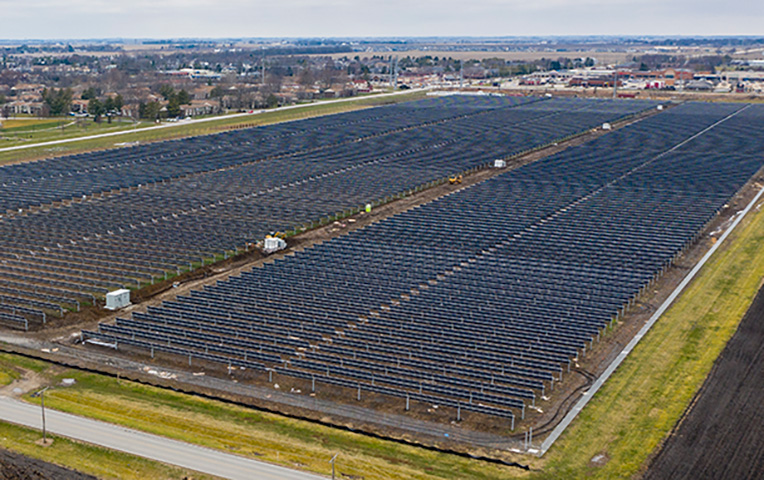While solar energy represents an offset of fossil fuels in our Nation’s energy infrastructure, we often don’t talk about the methods developers use to reduce their footprint in the construction and operations phases of the projects themselves. In the first of many internal presentations held by Sol’s Sustainability Task Force (STF), which works to promote sustainability and provide employees and the public with access to education and resources, Sol experts Jill Rathke and Juliana Isaac guided the team through the different ways that Sol and other developers can reduce our carbon footprint throughout the development cycle of our projects and the fast-growing trend of low-impact solar development.
Low-impact solar development continues to growth and evolve within the solar industry. Practices of this type of solar development include using existing and native vegetation rather than re-seeding with turf grass or clearing vegetation from the site and using livestock grazing in place of mowing, reducing emissions from heavy equipment. These projects provide some incredible environmental benefits including soil health, ecosystem stability, habitat for native species, opportunities for local partners, reduction in Operations & Maintenance (O&M) costs, and reduced need for environmental mitigation.
Chief among these topics are the perks and positive impacts of pollinator-friendly solar and Sol Systems’ commitment to integrate pollinator habitats into projects to enhance ecological benefits including soil stability and create habitat for pollinators and native species. This intitative is imperative due to declining pollinator populations. Sol plans to create a vegetation management plan that uses a mix of native grasses and wildflowers to provide habitat to those species. Our team is also exploring different carbon impact solutions such as the integration of solar grazing, where animals like sheep are deployed to graze the fields as a means of maintenance, which would reduce emissions from mowing and provide support for local farmers. Always looking to engage employees, Juliana and Jill then led a discussion on the opportunities for sustainable development like tree removal and replanting and the importance of public outreach and education behind those efforts, which led to ideas for future projects. As the presentation wrapped up, the focus turned to the future of ecological and sustainable solar projects with the adaptation of agrivoltaics, the fusion of agricultural practices in solar development, and the growing market for voluntary carbon offsets transactions for carbon sequestered in soil. One thing was very clear, every sustainable action taken when developing a solar project adds value and further promotes the solar industry’s commitment to creating an environmentally conscious community within the areas we serve.
The presentation itself marked a starting point for the types of educational opportunities regarding sustainable practices that Sol Systems is looking to increase through the company’s Sustainability Task Force (STF). Comprised of employees passionate about sustainability, STF volunteers its time to hit ambitious goals set by the company, and make sure that employees have all the tools they need to reduce their own carbon footprint in both their work and home lives.
In order to further build out data to inform sustainability-related decisions we make in the development phase, the STF’s focuses include project impact assessment through supply chain impacts and local project impacts. Only through evaluation, Sol Systems can now look to quantify improvements in the future. Sol is working with a group of students at the University of Illinois Urbana-Champaign, where Sol Systems is developing the school’s Solar Farm 2.0 project, to study the carbon impact of our projects that stem from materials, manufacturing, shipping, recycling, construction, land changes, and soil carbon levels.
The Sustainability Task Force will continue its efforts to educate and promote their sustainability initiatives. Keep an eye out for more presentations, action items, and sustainability tips from STF as they reach their 2020-2021 goals!
ABOUT SOL SYSTEMS
Sol Systems is a leading national solar energy firm with an established reputation for integrity and reliability across its development, infrastructure and environmental commodity businesses. To date, Sol has developed and/or financed over 850 MW of solar projects valued at more than $1 billion for Fortune 100 companies, municipalities, counties, utilities, universities and schools. The company also actively shapes and trades in environmental commodity and electricity markets throughout the United States. The company was founded in 2008, is based in Washington D.C, and is led by its founder. Sol Systems works with its team, partners, and clients to create a more sustainable future we can all believe in. For more information: www.solsystems.com



